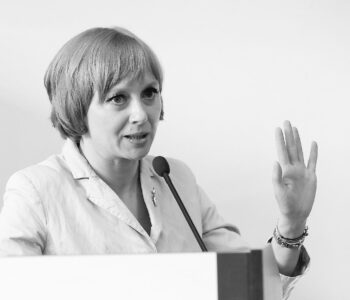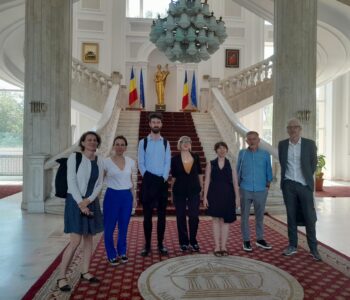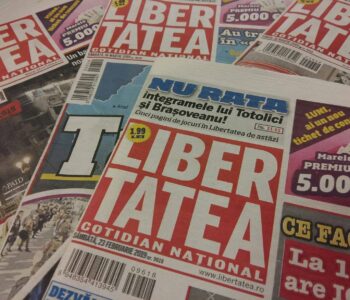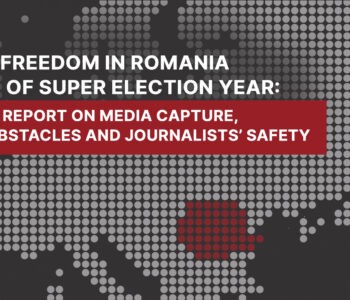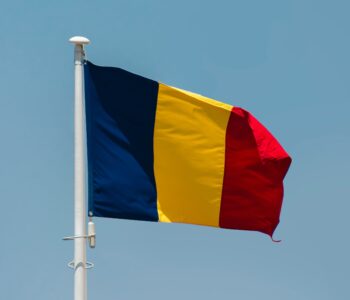Major political parties and Romanian media outlets have in recent years signed significant contracts for political advertising, though transparency mechanisms are lacking. The content paid by parties is not marked as such, meaning the public can not distinguish bought publicity from legitimate journalistic content.
As Romania heads into a super electoral year in 2024 with four elections taking place, the issue of funding to the media – especially by the country’s largest political parties – is back in the spotlight.
Non-transparent funding of the media by some political parties distorts the public agenda and the tax payers are deceived by non-transparent politically sponsored content that is falsely promoted as journalism, Romanian press freedom NGO ActiveWatch writes in its recent report.
Cristian Andrei, a Romanian journalist specialized in contracts between press and political parties, told IPI that the mechanism is as follows: if a political party wants for example to promote a policy, they will take out a contract with a decoy agency, which then creates advertising contracts with news outlets. The content produced within the contract is not marked.
The contracts are paid with party subsidies that come from public money. Still, the content of these contracts are kept secret, as well as the media outlets that publish this content.
Citizens are basically being lied to with their own money, which, we must admit, is quite a feat, journalist Codruța Simina says in an interview for ActiveWatch.
According to journalists and civil society groups, these often lucrative advertising contracts have led to a drop in critical journalism as media soften or adapt their reporting to favour the party funding them. Romanian think tank Expert Forum states that the contracts reduce the independence of the media.
Romanian independent journalists have described the mechanism as a form of clientelistic bribery between politics and media which encourages self-censorship on certain topics or themes.
Increase in contracts after 2015
While the use of advertising money as a means of soft censorship of the press in Romania is by no means new, the money flowing into media from bigger political parties has surged in recent years, raising heightened concerns about its impact on editorial independence.
Political parties use public funds to buy the favorability of journalistic media”, says Cristian Andrei in an interview for IPI. “In big contracts of over one million euro annually, news outlets start to either avoid criticism or be less critical. A mechanism of auto-censorship appears. The political party is not demanding this directly, but the outlet changes its attitude as a result of the money it has received.
Politically paid content in Romanian press was made possible by a legislative change in 2015. Crucially, the contracts between political parties and media outlets are secret in Romania, which makes it hard to prove concerns about press freedom. According to public budgets, in 2022, the government coalition parties PSD and PNL spent altogether over 90 million Romanian lei (18.5 million euro) in contracts with media.
Contracts between political parties and news media have been growing significantly in recent years. According to Romanian news media Libertatea, in the first six months of each year, in 2021 the sum reached 24 million lei (4,8 million euro), in 2022 it was 47 million lei (9,5 million euro), and in 2023 it was 58 million lei (11,7 million euro). This has been happening simultaneously while the subsidies for political parties have been growing.
In some months the big Romanian political parties have bigger budgets allocated for press than big corporations, such as Coca Cola, Andrei compares.
The Prime Minister of Romania, Marcel Ciolacu, has justified the political advertising as allowing for parties to gauge the public reaction for different political initiatives. The advertising revenue has also represented a financial boost to many media outlets struggling in a small market.
There is no real debate, no pressure on politicians to change the system, ActiveWatch writes in its report.
However, the threat for democracy is strong especially due to the approaching bumper election year. In 2024, four different elections are due to be held in Romania: local elections, parliamentary elections, presidential elections and European parliament elections. As parties fight for public opinion, the already sizable influx of non-transparent money into the system will only increase, further complicating the ethical dilemmas of the media.
In the election year 2024, paid information can distort the vote, ActiveWatch writes.
International concerns
The millions of euros of politicized content pouring into Romanian media have also become a concern on the European level. In the Media Pluralism Monitor’s report in 2022, Romania was put into the highest risk group with Bulgaria, Greece, Hungary, Malta, Poland and Slovenia.
The Council of Europe and European Commission have both noted in recent reports that Romanian media does not provide enough information about the content paid by political parties and that these contracts have a detrimental effect on press freedom.
The Romanian public lacks trust in the system as well. The Reuters Institute for the Study of Journalism has recently reported that only one fifth of the country’s population thinks that the Romanian press is free from political influence. Only one third of the population trusts the news.
100,000 euros for an interview
Only a few of the numerous contracts between political parties and media companies in Romania have become public due to investigative journalism.
Online media Recorder published in autumn 2022 an investigation according to which political parties agreed contracts with some of the biggest television channels in Romania – Antena 3 and Digi24 – as well as online publication Hotnews and Newsweek-magazine.
Due to a lack of transparency, the exact number of media outlets benefiting from the advertising campaigns is not fully known. According to ActiveWatch, most of the time the money is channeled to websites of TV channels, as buying editorial content directly from the television channel outside the electoral period is prohibited by the broadcasting law.
The money goes through the websites of television channels, so that this money ends up feeding those that actually interest us: television channels, explained an anonymous member from PSD’s lead for Libertatea.
Recorder also had access to documents showing how PNL paid 1 000 euros per piece for 120 positive news articles about its activity. The paid articles were not marked as advertorials.
Companies have also been paid to distribute content that would most likely have been reported in any case, as they are in public interest. These include filming speeches in political meetings, being paid 5 000 euros per speech (65 000 euros altogether), broadcasting a press conference for 69 000 euros and conducting an interview with a presidential candidate costing 3,000 euros per minute, with a final cost of 100,000 euros. Two of the latter were marked ambiguously as “electoral debate” in TV due to the external funding.
“Many people watch such broadcasts and have no idea that the party paid for the airtime, and the moderator is not in the position of a journalist free of any constraint, but in the position of a host who has to put the client who paid for the broadcast in a favorable light”, Recorder explains in its story.
Distorting the media landscape
Journalist Dan Tăpălagă from the independent publication G4Media blames Romanian media for the situation. According to him the Romanian news media is distorted, non-functioning and its situation is critical.
“Romanian media accepted to play the political game. The watchdog of democracy is happy to receive small treats from the government and no longer barks at the government. It is wagging its tail happily, hoping that it will receive more easy money from the state. This easy money is distorting the media landscape”, he told IPI in an interview.
Tăpălagă says that only a part of Romanian media – some small online publications – covers topics that are unfavourable for the government. “Journalists here in Romania are not doing active propaganda on how good the political parties and government are. They play smarter: they avoid topics that are embarrassing for the government”, he added.
In September 2022, G4Media initiated a statement with two NGO’s in which they wanted to raise the alarm about the “unprecedented degradation of Romanian media landscape”. According to the statement, Romania risks facing the same situation where Hungary is and to lose European funds, if it won’t take measures to diminish political control over the free press.
We have a media that is completely quiet. Too quiet for this country, Tăpălagă says. He considers that the situation of Romanian media got worse with significant media subsidies, worth 40 million euros, that were given out during the corona pandemic in May 2020. These public funds are not unconditional money, Tăpălagă added.
Only hope for recovery comes from Brussels
The Romanian media market is suffering from Stockholm syndrome, says vice president Ionuț Codreanu from the Romanian press freedom NGO ActiveWatch “Mainstream media is too accustomed and familiar with political parties. The vast majority of media outlets don’t want to disturb political governance”, he says.
This also misleads the public, as they don’t get the actual news in their preferred media.
If people don’t hear something on the TV, they don’t believe it, journalist Ovidiu Vanghele describes the situation to ActiveWatch.
Codreanu underlines that solid independent media still exists in Romania, but it suffers from financial instability and brain drain.
According to ActiveWatch, there are also reasonable suspicions that political parties make contracts with media outlets to launch smear campaigns against their opponents.
ActiveWatch underlines media companies own responsibility for the current situation. “These commercial relations would not be possible without the active participation of media outlets that mislead their own audiences”, it writes in its report.
ActiveWatch considers that the mechanisms between press and political parties seem impossible to eradicate, and that the opacity of government parties is increasing in direct proportion to the sums these parties are investing in media. In its report, the NGO puts hope in forthcoming regulation on political advertising that the EU is working on, which should lead to more transparency in public communication. The European Parliament and European Council are currently negotiating the regulation.
The only hope for a slow recovery of these mechanisms also comes from Brussels, ActiveWatch wrote in its recent newsletter.
In the proposal for regulation, political advertisements need to be adequately labeled to distinguish them from editorial content. They will also be accompanied by a transparency notice, which will state for example the identity of the sponsor and the amounts spent.
The European Parliament has also been working on the draft Media Freedom Act (EMFA). Still, Codreanu considers the Romanian government to be superficial when transposing the European framework into national legislation.
I don’t believe our legislator is very serious when it comes to adapting new European principles, he says.
In its report, ActiveWatch says it has not identified any other country where political parties finance private media similarly to the current Romanian model.
How should the situation be solved? Journalist Cristian Andrei thinks that political parties should disclose the amounts they are paying, names of the publications and types of content and services they paid for on a monthly basis. In addition to this, all paid content should be marked.
However, Romanian politicians have opposed these ideas. The leader of the PSD group in the Chamber of Deputies, Alfred Simonis, told Europa Liberă that he “supports transparency in the spending of public funds, but that transparency should not lead to a situation where political competitors find out a party’s communication strategy and therefore the marking of articles paid for by the party should only be done 30 days after publication.”
The path forward remains unsure, but the situation is serious. Romanian civil society and journalists have hoped for reactive measures from an European level in 2023, before the electoral year starts. So far the international community has been quiet.
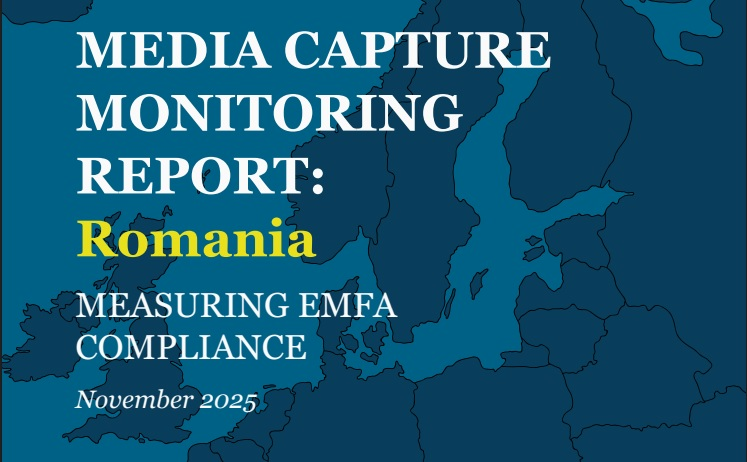 Library
Library


